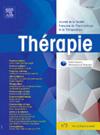疼痛专科医生与患者对止痛药物依赖性的认知不一致:一项多中心横断面研究。
IF 2.2
4区 医学
Q3 PHARMACOLOGY & PHARMACY
引用次数: 0
摘要
目的慢性非癌症疼痛患者被转诊到疼痛中心,以改善其疼痛治疗。如果止痛药疗效不佳,患者可能很难接受停药,尤其是阿片类镇痛药。以往的研究表明,从患者的角度来看,尽管疼痛缓解不足,但对慢性疼痛负面影响的心理缓解和处方阿片类药物的戒断症状是持续使用阿片类药物的驱动因素,也是阿片类药物使用障碍的第一阶段。目前还没有有效的工具来调查这种心理依赖。本研究旨在评估患者与疼痛专科医生对止痛药物依赖性认知的不一致,并研究其与患者特征、疼痛类型和先天性药物依赖性之间的关联。在法国的六家疼痛中心对患者和医生进行了自填式问卷调查。通过科恩卡帕系数(Cohen kappa coefficient)对两者之间的不一致性进行评估。人口统计学、疼痛、焦虑和抑郁、止痛药戒断症状、转移用药和渴求是多变量模型中研究的变量,这些变量可能与患者和医生之间的不一致有关。不过,双方的一致性尚可(kappa = 0.38;CI [95%]:0.25-0.51)。几乎所有患者(89.3%)都接受了阿片类镇痛药治疗。结论:考虑到患者对止痛药物的依赖性和精神作用,尤其是对治疗难度较大的非痉挛性疼痛患者的依赖性和精神作用,可以改善改变疼痛治疗方法的医学共同决策。本文章由计算机程序翻译,如有差异,请以英文原文为准。
Discordance between pain specialists and patients on the perception of dependence on pain medication: A multi-centre cross-sectional study
Aim
Patients with chronic non-cancer pain are referred to pain centres to improve their pain treatment. The discontinuation of pain medications in case of poor efficacy can be difficult to accept for patients, particularly opioid analgesics. Previous research has described that from the patients’ perspective, the psychological relief of a negative effect of chronic pain and withdrawal symptoms of prescription opioids represent drivers of persistent use and first stage of opioid use disorder, despite insufficient pain relief. There is no validated tool to investigate this psychological dependence. This study aimed to assess discordance between patients and pain specialists in their perception of dependence on pain medication and investigate associations with characteristics of patients, type of pain and iatrogenic pharmacodependence.
Methods
Self-administered questionnaires (patients and physicians) were administered in six pain centres in France. A question on perceived dependence on pain medications was addressed to the patient and the physician in a matched pair. Discordance between them was evaluated by the Cohen kappa coefficient. Demographics, pain, anxiety and depression, pain medication withdrawal symptoms, diverted use, and craving represented variables studied in a multivariate model as potentially associated with patient-physician discordance.
Results
According to the 212 pairs of completed questionnaires, a perceived dependence was reported by the majority of patients (65.6%) and physicians (68.4%). However, the concordance was fair (kappa = 0.38; CI [95%]: 0.25–0.51). Almost all patients (89.3%) were treated with an opioid analgesic. A higher likelihood of discordance was observed when patients suffered from nociplastic pain (odds ratio [OR]: 2.72, 95% [CI]: 1.29–5.84).
Conclusion
Medical shared-decision for changing pain treatment could be improved by taking into account the perception of patient dependence on medications for pain relief and or psychoactive effects, particularly in nociplastic pain for which the treatment is challenging.
求助全文
通过发布文献求助,成功后即可免费获取论文全文。
去求助
来源期刊

Therapie
医学-药学
CiteScore
3.50
自引率
7.70%
发文量
132
审稿时长
57 days
期刊介绍:
Thérapie is a peer-reviewed journal devoted to Clinical Pharmacology, Therapeutics, Pharmacokinetics, Pharmacovigilance, Addictovigilance, Social Pharmacology, Pharmacoepidemiology, Pharmacoeconomics and Evidence-Based-Medicine. Thérapie publishes in French or in English original articles, general reviews, letters to the editor reporting original findings, correspondence relating to articles or letters published in the Journal, short articles, editorials on up-to-date topics, Pharmacovigilance or Addictovigilance reports that follow the French "guidelines" concerning good practice in pharmacovigilance publications. The journal also publishes thematic issues on topical subject.
The journal is indexed in the main international data bases and notably in: Biosis Previews/Biological Abstracts, Embase/Excerpta Medica, Medline/Index Medicus, Science Citation Index.
 求助内容:
求助内容: 应助结果提醒方式:
应助结果提醒方式:


